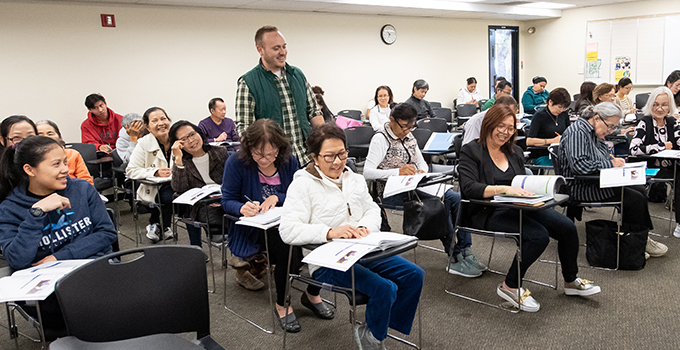New English Language Learner (ELL) program is one of GWC’s fastest-growing academic offerings
It’s 8:45 p.m. on a recent weeknight and the 45 or so students, many of them older adults, have been in class for more than two and a half hours. But a quick peek through a window shows they’re still fully engaged, laughing with their instructor as they continue to hone their English language skills.
Welcome to ELL (English Language Learners), one of the fastest-growing — and engaging — academic programs at Golden West College. A fresh spin on a traditional ESL (English as a Second Language) program, ELL teaches students practical, everyday English. How do you talk to a police officer? How do you order a hamburger? How do you engage in conversations with your children’s teachers? How do you talk to your boss?
Such are the countless scenarios ELL students learn. And, except for a nominal fee for a textbook, the eight-week, non-credit course is completely free, says Dr. Kay V. Nguyen, Dean of Research, Planning, and Institutional Effectiveness at GWC. Nguyen, who was tasked earlier this year by GWC President Tim McGrath to launch and oversee ELL as part of a broader push to expand non-credit course offerings, says the program is rolling “full-steam ahead.”
“At the beginning of the fall semester, there was a level-one ELL class designed for 45 students, and we had over 70 students sign up for the class,” Nguyen says. “I had to pivot quickly and find more classroom space and look for new faculty members, and then we had to split the class. That’s how popular our classes are.” New to GWC this fall, ELL has a total enrollment of more than 2,000. That translates to about 1,000 students, many of whom take multiple courses. Students range from teenagers to octogenarians.
“We know there’s a huge need,” says Nguyen, noting that there are close to 600,000 Orange County residents who speak limited English. Native Vietnamese, Spanish, Korean, and Chinese speakers make up the bulk of ELL students. “If you look at our course offerings,” Nguyen says, “they’re pretty packed.” Core ELL classes are Monday through Wednesday, grammar classes are Thursday, and Friday classes focus on pronunciation. “Students love the classes,” Nguyen says. “A lot of them actually take all three. We really designed this course to provide training for students to have everyday life English communication.
“We work on verbs and pronunciation, of course, but the idea is to really help engage students and provide them with the tools necessary to be successful.”
Based on an anonymous survey of ELL students, the 25 or so part-time instructors, all of whom have master’s degrees, are doing exceptionally well. “They make sure that you’re doing good and they give tests often,” one student wrote. “Teachers take their job seriously, and the classes are close to my house. I’m saving time and gas.”
Wrote another student: “The teachers teach with their whole heart. Teachers and students are like members of a family.”
FIRST-HAND EXPERIENCE
Nguyen, who has been at GWC for six years, knows well the challenges and rewards of learning to speak English. Born in Vietnam, her family immigrated to San Diego County in 1994. Owners of a small business in Vietnam, her parents attended community college to learn to speak English. Nguyen and her four older siblings also went through the challenges of mastering a foreign tongue. “We definitely understand the experience of our students here,” says Nguyen, who went on to earn a bachelor’s and master’s degree in political science at UC Riverside, and a doctorate in higher education at Cal State University, Long Beach.
INVOLVED ON CAMPUS
In addition to learning to speak English, ELL students take advantage of all GWC has to offer, Nguyen says. “A good chunk of our students are over the age of 60, and they’re very integrated into the fabric of this campus, which is really wonderful,” she says. Many ELL students take advantage of GWC’s free bus pass program and have access to The Stand food pantry and The Rack working closet. They also have access to academic counseling and opportunities for financial aid if they decide to sign up for credit classes. “We’d like to transition our ELL students to credit courses and get them to where they want to be, whether it’s pursuing higher education degrees or obtaining fulfilling careers,” Nguyen says. She notes that ELL classes are very flexible.
“A lot of our students have outside obligations, and a lot of them travel,” Nguyen says. “The nice thing about ELL being non-credit is you can start and stop and there’s no cost, and you can always come back.” Nguyen says she plans to grow the ELL program as fast as she can. GWC is marketing its ELL program through radio and TV ads, as well as grass-roots promotion at the college’s weekend swapmeet and at area supermarkets.
One student joined after seeing an advertisement at the Westminster Mall. Another student wrote how ELL has made him less shy. Another wrote about how his improved English helped him secure a job promotion.
“When you see the students and you talk to them, their stories are inspiring,” Nguyen says, “The students just feel so lucky to be able to have access to a top-notch education.” “I would say what has made us so successful so quickly is our people. We have a great team, not just in my office, but every department on campus has been so supportive. Not only that, we have a great group of faculty who are dedicated to their profession, and they really support the students.”


